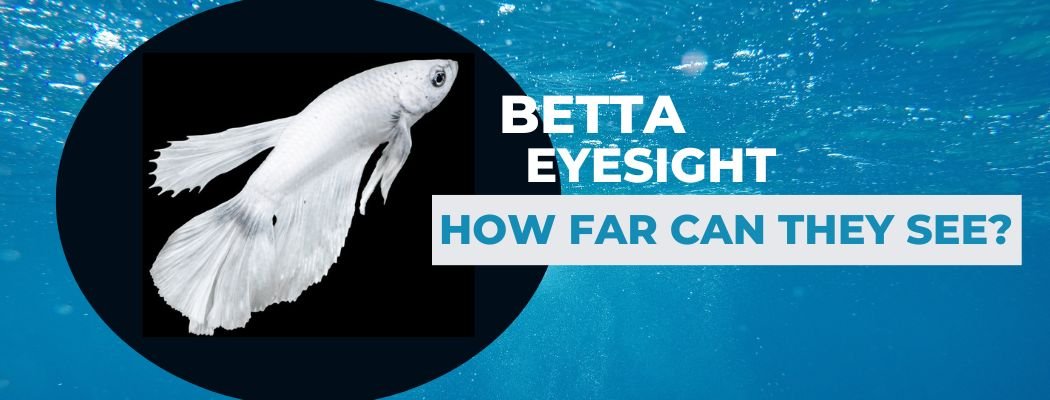Betta Eyesight: How Far Can a Betta Fish See? + Color and Night Vision
Have you ever stopped to wonder how far your betta fish can see? These little fish may seem small and simple, but their vision is quite complex and sophisticated. Bettas have impressive eye power that allows them to navigate their underwater world easily.
Let’s take a deeper dive into these fish eyes.
Betta fish vision
Bettas are clear and colorful creatures. But is their vision crystal clear as the water in their aquariums, or is it a little more… murky?
Bettas have eyes similar to ours in some ways but also worlds apart. For starters, betta fish have “tubular eyes,” which means their eyes sit on either side of their head (similar to a horse) rather than facing forward like ours. Tubular eyes give them a wide field of vision, allowing them to spot predators (or those annoying tail-biting tank mates) from all angles.
The structure of their eyes is also different. Unlike humans, who have round pupils that dilate and contract to adjust to different light levels, bettas have vertically-oriented slits for pupils that allow them to see both up and down simultaneously. And unlike humans, who have a single lens in each eye, bettas have multiple lenses that help them to focus on objects at different distances. Pretty neat?
All of these adaptations help betta fish navigate their environment, find food and avoid predators, which are essential for survival.
Betta fish color vision

Now, let’s talk about color. Betta can see a wide range of the color spectrum, and experts believe it uses its color vision to communicate with other bettas and find food.
It’s similar to how humans use color vision. For example, if we see a friend whose face is paler than usual, we may believe they are sick. We also use colors to determine if a fruit is ripe, and we pick up the sweet yellow bananas from the store and aren’t interested in the bitter green ones (yuck!)
You can even try it yourself with your betta and place bright-colored items in the tank and see if they are more curious about it than a grey item. Perhaps they are more drawn to colored food than bland food.
But even more fascinating: Bettas can see colors that we can’t! They can see ultraviolet light using photoreceptors in their eyes called “double cones.” UV light is a wavelength outside our color spectrum, so we can’t see it, but we can use equipment and sensors to spot it and “transform” it into colors that we can see. The same is true about infrared light, which is on the opposite side of the color spectrum.
It’s impossible even to imagine how a color we can’t see could look. Just try it yourself, and you will feel like your brain is a calculator trying to divide by zero: it just produces an error.
Betta fish night vision
But what about when the lights go out? Can bettas still see in the dark? Yes, but their vision is much sharper in daylight. Their eyes can adjust to different light levels, allowing them decent vision in bright and dim light environments.
Betta’s eyes are pretty complex, and they have yet another cool thing in their eyes. It’s called “tapetum lucidum” if you wanna be nerdy. This tapetum lucidum reflects light through the retina and helps the fish see in the dark. It’s like a night vision. Scientists believe that the betta has evolved this function to be a tool for survival, making it easier to navigate, find food, and escape predators in the dark.
If you thought bettas were cool just because they are known as Siamese Fighting Fish and act badass and aggressive, then you can add night vision to the list, and they are even more impressive.
Other betta senses

Besides vision, bettas also have other senses that help them survive in their habitat.
Did you know that they have a great sense of smell? They use it to find food and sniff for potential mates.
Bettas also have a hearing through that can pick up sounds and vibrations in the water.
Touch and detecting temperature is crucial since cold-blooded fish must avoid too cold or too hot waters. Using a lateral line organ, a type of pore in the fish’s scale with sensory hair and sensory cells connected to a nerve, the bettas can sense movements and pressure in the water, which many schooling fish also have.
How Far a Betta Fish Can See
Scientists believe that a betta fish can see approximately 70 feet. However, it isn’t easy to give a specific distance to how far a betta can see because it depends on many factors, such as the betta’s age, the size of its eyes, and the conditions of the water and the light. In low-light settings and murky water, the vision is significantly worse.
It is still not determined how sharp their vision is over a long distance and whether they can see in detail or see objects or shades of colors. We still need to determine if their vision is more like 4K resolution or closer to 240p.
If you suspect your bettas can’t see the food you are giving them, you may want to turn on more lights or clear the water.
Frequently Asked Questions about Betta Eyesight
Can betta see their human owners?

Can bettas see and recognize their caregivers? It’s possible, as bettas are highly intelligent and can learn and remember different stimuli, including the sight and smell of their human owners. So, if your betta recognizes you and comes swimming over when you approach the tank, it’s probably not just a coincidence!
Can bettas see food in the dark?
Yes. Bettas have night vision from a tapetum lucidum in their eyes which reflects light through the retina, but their day vision is much better.
Do bettas need a light at night?

Tank lighting is unnecessary, but having a light on for a few hours in the evening can be a good idea for a few reasons. The evening is when owners are home and have the time to observe their betta’s behavior, so it’s easier to notice any symptoms or signs of distress or illness. Another idea is that a bit of light at night can mimic the moonlight they experience cyclically in their natural habitat. Some owners claim that bettas don’t need light and that it just ruins their day and night cycle. If you decide to go with a light, ensure to use a significantly dimmed low-watt light, and provide them hiding spots and dark places in the tank, as high light levels can be stressful.
Do bettas prefer specific colors or patterns?

This a contentious topic as some betta owners swear that their fish prefer a specific pattern or color. In contrast, others claim that bettas don’t behave differently no matter what color or design you present. The answer is that we don’t know the subjective experience of bettas, and we can only make opinions based on how it behaves and responds to stimuli.
Conclusion
For being a small fish, bettas vision is quite impressive, as they can see colors we can’t and even see in the dark and other senses of smell, hearing, and touch. How far they can see is not easy to know as we can’t communicate with them or know their subjective experience, but some scientists believe it’s approximately 70 feet. Proper light conditions can make your betta more comfortable in their sweet home.

